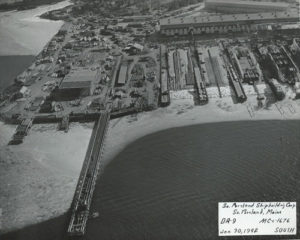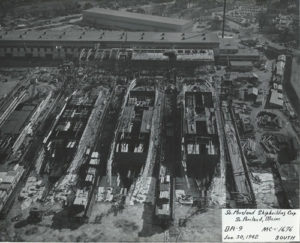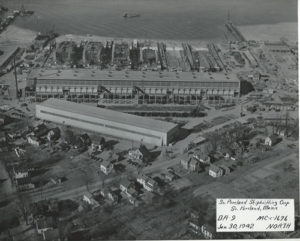 Like many of its counterparts around the country, the South Portland Historical Society’s museum has been closed since the onset of the pandemic. The small size of the building in Bug Light Park, combined with the older age of the society’s volunteers, make keeping the museum’s doors open a risk.
Like many of its counterparts around the country, the South Portland Historical Society’s museum has been closed since the onset of the pandemic. The small size of the building in Bug Light Park, combined with the older age of the society’s volunteers, make keeping the museum’s doors open a risk.
But Executive Director Kathy DiPhilippo, who began as a volunteer in 2004, wants you to know that this hasn’t changed much about its operations. Exhibition is not the entire mission of a historical society, and volunteers at the South Portland Historical Society remain hard at work. Some collaborate with local cemeteries, while others on the education committee spend time crafting an educational curriculum for schools in light of cancelled field trips. “We’re not a museum,” DiPhilippo says. “That’s just one of the things we offer.”
In fact, since its inception in 1962, many years have passed in which the South Portland Historical Society has existed with no museum at all. She emphasizes that the primary component of its mission is to collect and preserve the history of the city, much of which is accomplished through donations of material, like artifacts and photographs, to their archives. This can be achieved regardless of opportunities for display.
Even under the current circumstances, DiPhilippo underscores that “there’s just zero change in this mission for us. It is and always will be the biggest part of who we are.”
 Still, DiPhilippo notes that “being able to put a public face to a historical society by having museums is helpful.” When a historical society has little or no exhibition space, like when this one was housed in the basement of city hall—“that was a low point”—these donations tend to dry up. However, while the museum is now closed, this has fortunately not been the case this year.
Still, DiPhilippo notes that “being able to put a public face to a historical society by having museums is helpful.” When a historical society has little or no exhibition space, like when this one was housed in the basement of city hall—“that was a low point”—these donations tend to dry up. However, while the museum is now closed, this has fortunately not been the case this year.
“Now I’m living through a time here where we also don’t have a museum, but I would say that it hasn’t slowed down our donations. People have been at home cleaning and organizing, and they recognize that these things around their home would serve the South Portland Historical Society.”
The SPHS manages an online museum containing over 10,000 images on view for the public, so the pandemic just meant that exhibition had to be done in a virtual format.
That this digital platform was in place before the museum had to close its doors is a testament to the historical society’s commitment to making public the history they’ve collected. In large part, historical societies exist to serve as repositories of original records of a location.
When thinking about research, DiPhilippo expresses a deep commitment to getting it right: “If you go searching the internet and see the mistakes that are there, you’ll realize that the only real way to do your research is to go back to the original materials.”
In a digital age bereft of direct fact, historical societies, no matter how big, remain bastions of historical truth.
 “After having spent a good portion of my career in this field, and living through the political times we’ve been living through, it is so apparent to me that understanding of history is important,” says DiPhilippo. “How can you develop policy if you don’t know what has happened before? Things that work, things that haven’t worked, why didn’t they work? That’s what an education is about.”
“After having spent a good portion of my career in this field, and living through the political times we’ve been living through, it is so apparent to me that understanding of history is important,” says DiPhilippo. “How can you develop policy if you don’t know what has happened before? Things that work, things that haven’t worked, why didn’t they work? That’s what an education is about.”
While the South Portland Historical Society isn’t physically open to the public, its mission of preserving the history of a community, and ensuring it is accessible and understandable to that community, perseveres.
The digitized archive can be accessed on the website of the South Portland Historical Society, at: sphistory.pastperfectonline.com/
There you can view the collection and, if you’re able, make a monetary donation. “We’ll definitely appreciate it,” says DiPhilippo.





